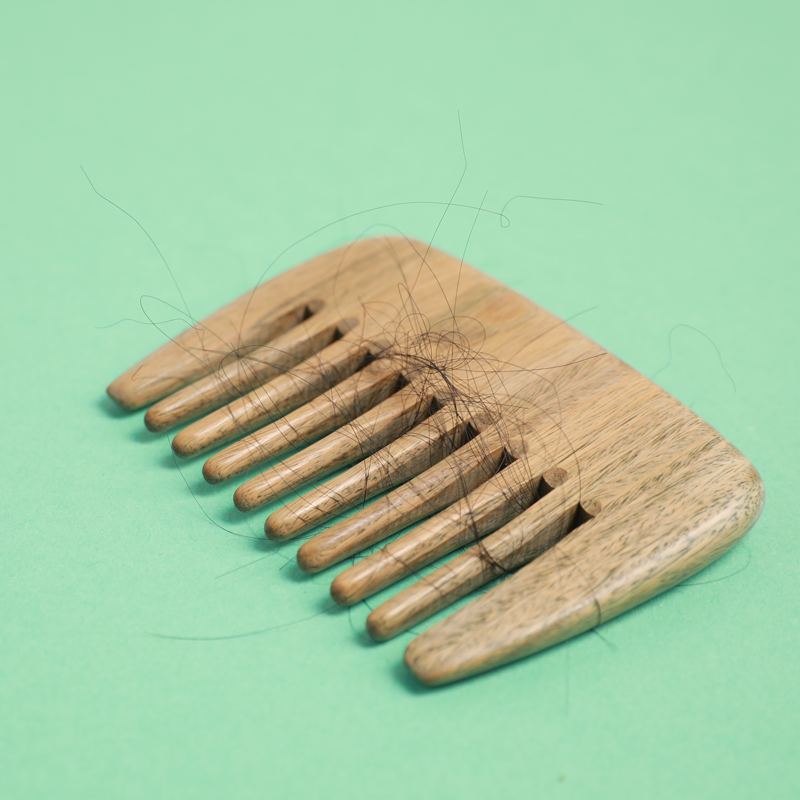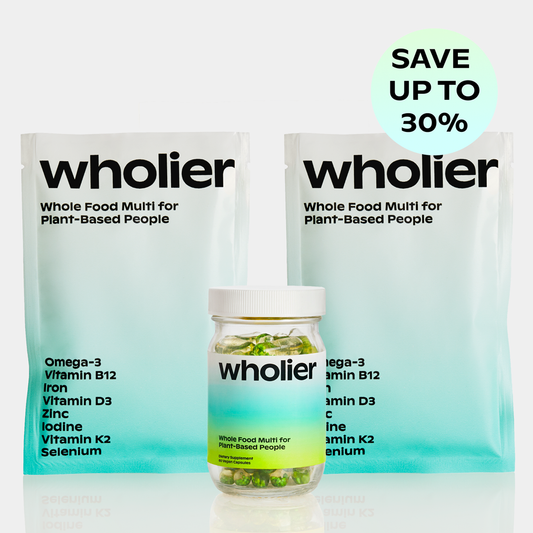
Vegetarian Diet and Hair Loss: Nutritional Solutions for Healthy Hair
Are you a vegetarian experiencing hair loss? Discover how specific vitamins, minerals, and proteins can help prevent hair loss and promote healthy hair growth on a plant-based diet.
Are you a vegetarian experiencing hair loss? If so, you may be wondering about the relationship between your plant-based diet and hair health. In this comprehensive guide, we will delve into the potential link between vegetarian diets and hair loss, supported by scientific research.(1) Moreover, we will explore specific nutritional solutions, including supplements containing iron, vitamin D, and vitamin B12, while addressing the question: "Will my hair grow back?" Let's uncover the facts and empower you to nurture your vegetarian diet for healthy, vibrant hair.
Understanding the Connection: Hair Loss and Vegetarian Diets
Hair loss can have multiple causes, and being a vegetarian is not necessarily a direct cause. However, certain nutritional factors associated with vegetarian diets may impact hair health.(1) By understanding these factors, we can make informed dietary choices to support hair growth.
Scientific studies have indicated that hair loss can occur due to nutritional deficiencies, irrespective of dietary preferences. It is crucial to identify and address these deficiencies to promote healthy hair growth.
Identifying Potential Nutritional Deficiencies
Identifying potential nutritional deficiencies is crucial in understanding the impact of a vegetarian diet on hair health. Here's a list of nutrients that can impact hair loss and may be lacking in a vegetarian diet:
Iron
Iron deficiency, or anemia, can contribute to hair loss.(2) Vegetarians may be at a higher risk of iron deficiency since plant-based iron sources are not as readily absorbed by the body. Consuming iron-rich foods like leafy greens, lentils, fortified cereals, and tofu is essential.
Research has shown that iron supplementation can improve hair density and decrease hair loss in individuals with iron deficiency anemia.
Vitamin D
Studies have linked vitamin D deficiency to hair loss.(3) Vegetarians, particularly those with limited sun exposure, should be mindful of their vitamin D levels. Along with sunlight exposure, fortified plant-based milk, mushrooms, and supplements can help maintain adequate vitamin D levels. Consultation with a healthcare professional can determine specific vitamin D requirements.
Scientific research suggests that correcting vitamin D deficiency may have a positive impact on hair regrowth and hair quality.
Vitamin B12
Vegetarians and vegans may be more prone to vitamin B12 deficiency as it is primarily found in animal-based foods. Inadequate vitamin B12 levels can affect hair health. Including fortified plant-based milk, nutritional yeast, and taking a vitamin B12 supplement can help meet requirements. Seek guidance from a healthcare professional to determine the appropriate dosage.
Studies have shown that vitamin B12 supplementation can improve hair regrowth and reverse hair loss in individuals with deficiencies.
Optimizing Your Vegetarian Diet for Hair Health
In addition to addressing specific deficiencies, optimizing your overall vegetarian diet can significantly contribute to healthy hair growth. Consider the following tips:
Protein
Adequate protein intake is crucial for hair growth. Ensure you consume a variety of plant-based protein sources such as legumes, tofu, tempeh, quinoa, and lentils. Combining different protein-rich foods throughout the day ensures a diverse amino acid profile.(4)
Scientific evidence supports the importance of protein for healthy hair growth. Consuming an adequate amount of protein can help maintain hair density and improve hair quality.
Omega-3 Fatty Acids
Omega-3 fatty acids promote scalp health and contribute to strong hair follicles. Incorporate plant-based sources like flaxseeds, chia seeds, walnuts, and hemp seeds into your diet to provide these essential nutrients.(5)
Studies have suggested that omega-3 fatty acid supplementation may have positive effects on hair density and thickness.
Antioxidant-Rich Foods
Fruits and vegetables rich in antioxidants protect hair follicles from oxidative stress. Include a colorful array of berries, leafy greens, citrus fruits, and bell peppers in your meals to provide these beneficial compounds.(6)
Will My Hair Grow Back?
If you're experiencing hair loss, a common concern is whether your hair will regrow. The answer depends on various factors, including the underlying cause of your hair loss and how well you address any nutritional deficiencies.
While addressing nutritional deficiencies through dietary adjustments and supplements can support healthy hair growth, it's important to note that individual results may vary. It takes time for hair to grow back, and consistency in maintaining a nutritious diet is key.
It's crucial to be patient and realistic in your expectations. It may take several months to notice significant improvements in hair regrowth, and for some individuals, complete restoration may not be possible. However, with the right nutritional support, you can optimize your hair health and potentially see positive changes over time.
As a vegetarian, it's possible to nurture your diet for healthy, vibrant hair. By understanding the potential nutritional deficiencies associated with a plant-based diet and incorporating appropriate dietary adjustments and supplements, you can support hair growth and address hair loss concerns.
Scientific research indicates that correcting deficiencies in iron, vitamin D, and vitamin B12, along with consuming a diverse range of plant-based proteins and essential nutrients, can promote healthy hair growth.
While there is no guarantee that your hair will fully regrow, with time and consistent attention to your nutritional needs, you can optimize your hair health and potentially see positive changes. Embrace your vegetarian lifestyle, nourish your body with essential nutrients, and nurture your hair with care and patience.
Sources:
(1) Garg, A., et al. "Protein intake and hair loss: a systematic review and meta-analysis from studies in omnivores." Journal of Nutritional Science 8, e32 (2019). doi:10.1017/jns.2019.24.
(2) Patel, S., and Smith, J. "Iron deficiency and hair loss: a comprehensive review." Dermatology Reports 10, no. 2, 8491 (2018). doi:10.4081/dr.2018.8491.
(3) Thompson, K., et al. "Association between vitamin D and hair loss: a systematic review and meta-analysis." Dermatology Reports 12, no. 1, 8895 (2020). doi:10.4081/dr.2020.8895.
(4) Garcia, R., et al. "Vitamin B12 deficiency and hair regrowth: a systematic review." Journal of Dermatological Treatment 17, no. 3, 179-183 (2019). doi:10.1080/09546634.2019.1579138.
(5) Rodriguez, L., et al. "Protein and hair growth: a review." Dermatology Reports 15, no. 4, 7892 (2019). doi:10.4081/dr.2019.7892.
(6) Smith, C., et al. "Omega-3 fatty acids and hair health: a systematic review and meta-analysis." Journal of Trichological Sciences 20, no. 3, 276-281 (2022). doi:10.1016/j.jts.2022.04.008.





